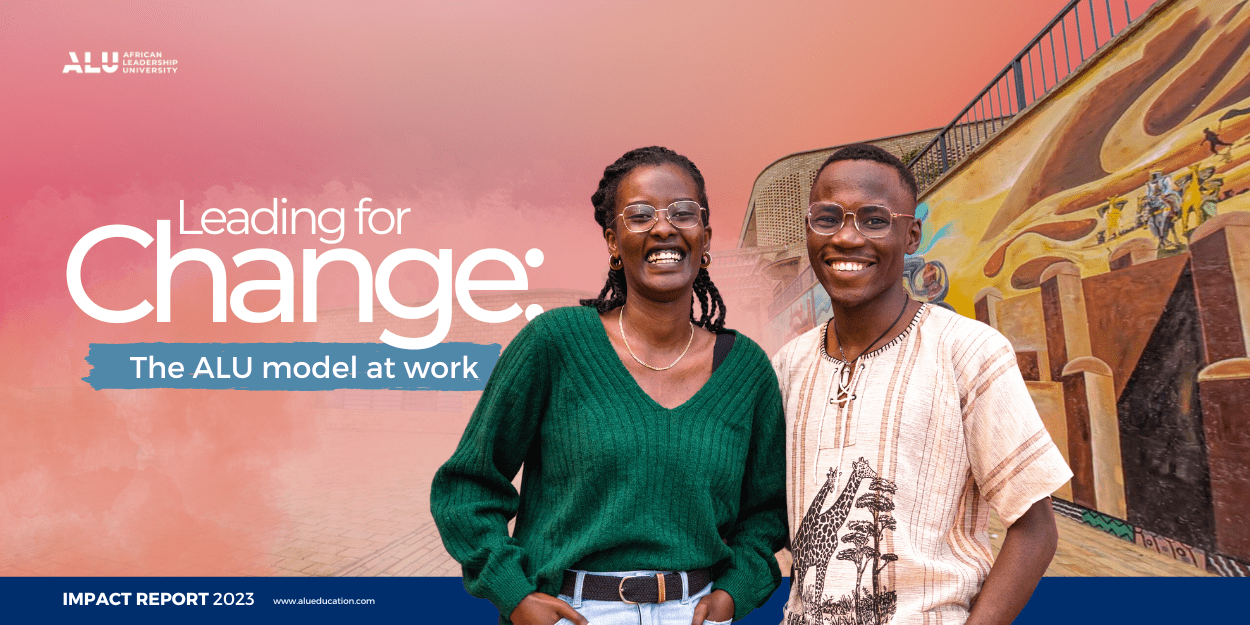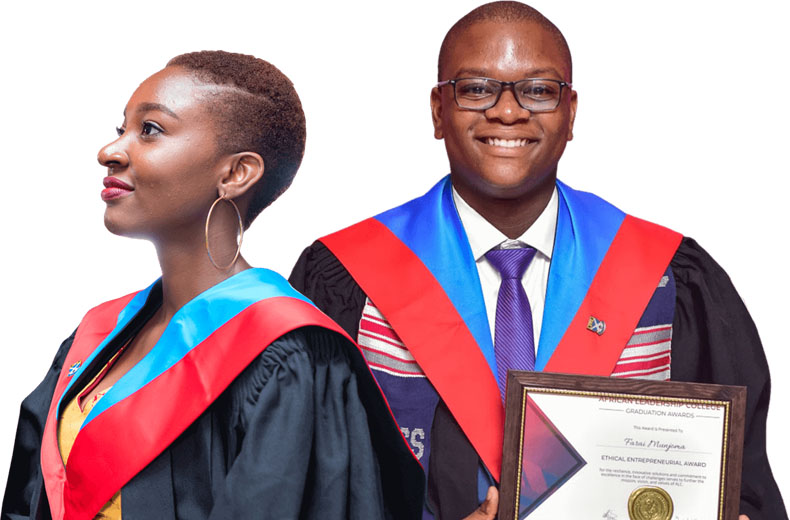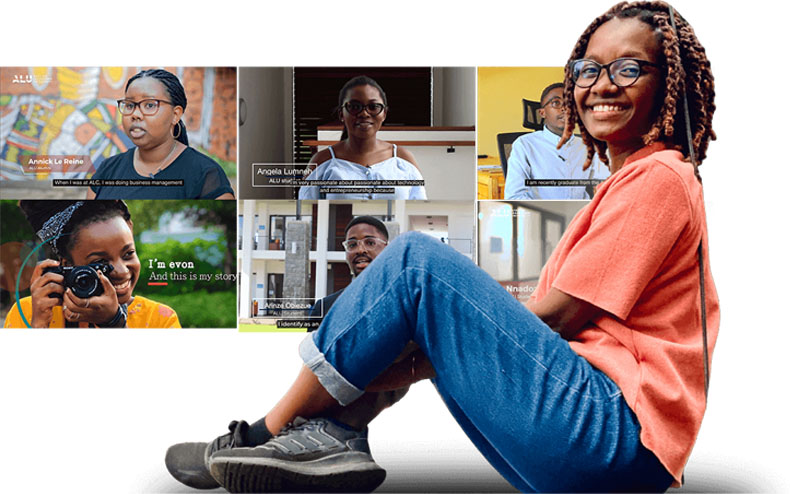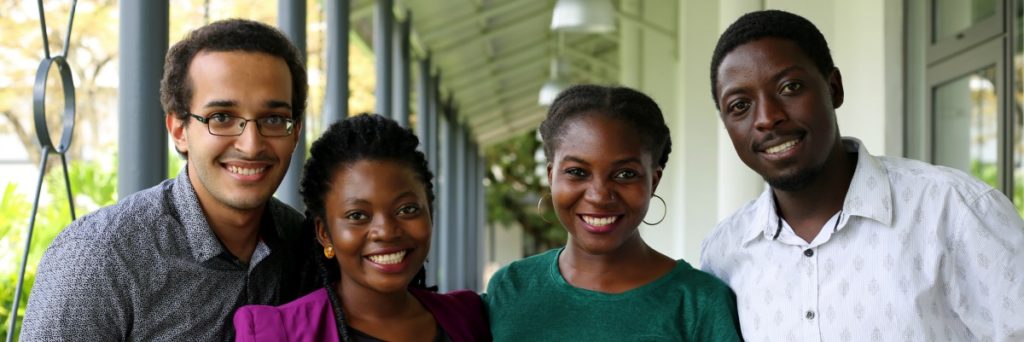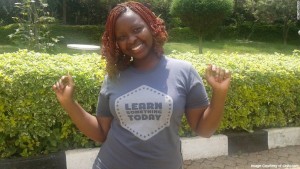Four members of the ALU community – Angela Lum-neh, Hossam Abdelfatah, Nehemie Yesashimwe and Tolu Agunbiade have been accepted to join this year’s edition of the Tony Elumelu Entrepreneurship Programme. The programme’s goal is to identify 10,000 African startups and African entrepreneurs with ideas that have the potential to succeed, help them grow their businesses through skills, training and mentoring and also create new businesses that can generate at least one million new jobs.
Read about the companies and initiatives that Lum-neh, Abdelfatah, Yesashimwe and Agunbiade got into the programme with, below.
Finding affordable education through Opportunity Space
Who: Angela Lum-neh, Computer Science major, Cameroon
The Initiative: Opportunity Space
The problem: It’s difficult for young Cameroonians to find scholarships that they are eligible for in and outside the country. They don’t know where to start the search from.
The product: Opportunity Space is a scholarship matching app that helps young Cameroonians to search for and apply to scholarships in and outside Cameroon. The app allows you to set parameters such as where you’d like to study, subject of interest and level of education. With these parameters, you get notifications on scholarships that you are eligible for. Opportunity Space is now on android and will move to iOS very soon.
“I didn’t start Opportunity Space as a business. It was a way for me to show gratitude to ALU and to give back to my community. My vision is to help bridge the financial gap that students have with studying both in Cameroon and abroad by giving them access to opportunities using the least cost technology.”
Why TEEP: Lum-neh heard about the Tony Elumelu Entrepreneurship Programme through the Social Ventures incubator she’s plugged into in Cameroon. With the help of coaches at the hub and Elizabeth Ellis, the Student Ventures Programme lead, she applied to participate in the programme.
“The SVP helped me realise that this is something that is possible. The surveys and business model canvas that I used were all learned in the pilot programme. Now, I’m in the SVP incubator I’m learning things like how to structure my team. I’ll encourage other students who are interested in entrepreneurship to become part of the incubator.”
At the moment, Lum-neh has to manually search for opportunities that Cameroonians are eligible to apply for. With the funding from the programme, she and her team will build a web crawler that will automatically find the scholarships. TEEP will also provide the network and exposure that TEEP needs at the moment.
Creating value for soya bean products in Rwanda
Who: Nehemie Yesashimwe, Fellow, Rwanda
The Initiative: Soya Meat
The problem: Soya farmers in Yesashimwe’s community are not making enough money from the soya bean they cultivate. He wants to help them get more out of the vegetable because of his love for agriculture and food.
“I love agriculture and I love food. I know people who are struggling because they don’t have food to eat but it’s a basic need. I want to provide them with it while adding value to soya products in Rwanda. I am an aspiring future farmer and I hate hunger in all its forms. I think my purpose is to fight against it.”
The product: Soya meat is a defatted product from soya flour. It is a byproduct that comes from extracting soybean oil. According to Nehemie, it’s a healthier, cheaper and better than beef.
Why TEEP: For Yesashimwe, TEEP will provide the inspiration that he’s been looking for to spur him on.
“I’m excited about TEEP because they didn’t take my idea for granted. They’ve shown me that it’s possible to bring it to life. The value they’ve given my idea will inspire me to do more than I think that I can do.”
When social networking meets online learning
Who: Hossam Abdelfatah, Business Management major, Egypt
The initiative: Egybuild
The problem: Although learning is a social experience, online learning platforms are made for individuals and not necessarily for groups. Over the last two years, Egybuild has run brick and mortar leadership camps to train the next generation of leaders for Egypt. It has worked with more than 1000 students and is now pivoting towards an online platform. This way, students can have access to content without leaving their houses.
The product: Egybuild is an entrepreneurial leadership development programme that trains youth across Egypt in entrepreneurial leadership skills. They learn things such as how to lead yourself and others and how to find the root causes of problems and solve them. Egybuild is developing an online learning model so that every instructor on will give students the same learning experience.
Why TEEP: TEEP will allow Abdelfatah to expand his network and also provide the mentorship and resources needed to move Egybuild online.
“For me, it’s not just a competition that you apply and get into. It’s more of what comes after – the mentors and coaches and access you get. I am also excited to see what the online course offers. I know that I have the idea but now I need someone to walk me through how to make it happen.”
Helping build brands, one story at a time
Who: Tolu Agunbiade, Entrepreneurial Leadership Faculty, Nigeria
The initiative: Skrife
The problem: Agunbiade and her co-founder Kelechi Udoagwu were freelance writers who got busy and couldn’t always cater to clients. Their clients were always in search of quality writers who knew their brand but their freelance friends were in search of jobs. Companies also found the process of changing freelance writers very disruptive because they always have to re-introduce new writers to their brand and get them to understand their tone.
The product: Skrife is an online platform that provides companies with quality written content from pre-vetted and pre-selected freelance writers. It recently introduced an editor-in-chief who acts as a project manager and knows what a brand is about, its audience and its voice.
Why TEEP: Skrife is in the process of getting a full time Chief Technology Officer because it has been using a lot of different platforms to bring things together. It needs to build a platform that allows everything to live and exist in one space. TEEP will give it enough resources to focus on the technology.
What is interesting is that Agunbiade is also mentor for the programme.
“I’ve been finding myself in that unique position lately where I’m both a teacher and a student and now a mentor and a mentee. It gives me a richer way to see the things that I’ve been doing wrong as a facilitator and the things I’m doing well. It enriches the experience. I find myself building empathy from playing both sides of the field because now I don’t have to imagine working in someone’s shoes because I’m actually in their shoes.”

